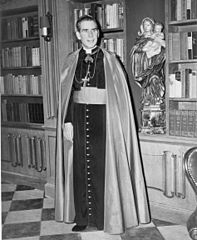
We are living at a time in which is hatred, intolerance, and violence are not only prevalent but seem to be increasing. Younger Americans no doubt wonder whether there was ever such disharmony in the past. These words by Bishop Sheen in 1941 answer:
“There are too many divisions and classes among us in America now; too many hates, too few deep loves; too much tolerance based on expediency, and not enough tolerance grounded in charity; too much tolerance of evil, and not enough intolerance of injustice.”
Innumerable social commentators have produced books and television shows offering their opinions about the causes of our disharmony. Most of them blame the political party they disagree with or some vague phenomenon such as Climate Change. Bishop Sheen offered a very different analysis of the problem:
“There is irrationality in America . . . [many people] are guided by emotion rather than by reason, who go on repeating catchwords and slogans that they never analyze, and who deny that there are any basic truths of reason, much less of revelation . . . The modern person’s] likes and dislikes determine his moral principles, instead of his moral principles determining his likes and dislikes.”
High on the list of concerns of today’s Americans is attacks on personal freedoms by government and social media. They believe there is a growing danger that the attacks will increase and our constitutionally guaranteed freedoms will be abolished. Freedom was also an issue in 1941. Bishop Sheen’s remarks on it are especially interesting because the perspective he criticized–seeing freedom as unconditional, if not absolute—has become more entrenched since that time. The tendency of many modern Americans will therefore be tempted to deny his view consideration. That reaction would be unwise because evidence is plentiful that feeling justified to do whatever one pleases is a factor in lawlessness. Here is what Bishop Sheen wrote:
“There is too general a tendency in our country today to interpret freedom as absence of law and restraint . . . [or] as the right to do whatever you please . . . They talk about freedom as if it were an end in itself, a life rather than an atmosphere of life . . . [But] “freedom means the right to do what you ought, and ought implies law, and law implies justice, and justice implies God . . . Whenever there is justice, there is freedom; but when there is freedom, there is not always justice.”
A subject that rivals Freedom for importance today is Democracy. Both liberals and conservatives claim to its defenders and accuse their opponents of undermining it. Bishop Sheen was more concerned with the origin and nature of Democracy than either of those claims. Here is how he expressed his view:
“Democracy is based not on the divine right of kings but on the divine right of persons. Each person has a value because God made him, not because the State recognizes him. . . . And when we deny God as the foundation of our rights, we shall no longer have rights. The Declaration of Independence . . . is a Declaration of Dependence. We are independent of dictators because we are dependent on God. [Emphasis added]
The final example I will offer is, in a way, even more relevant to America’s present dilemma that the dilemma of 1941. Over the last four years more and more Americans have expressed a lack of trust in the agencies of our society. Bishop Sheen spoke of a similar decline of trust in 1941. More importantly, he offered a way to overcome it.
“We are living in days of fear, and there is no escape from fear except trust. Everything else we trusted has failed us: universal education, progress, science, liberalism, totalitarianism. There is no one left to trust but the Father whose house as prodigal children we left for a false freedom.”
(Note: A Declaration of Dependence is available at Amazon and other bookstores.)
Copyright © 2023 by Vincent Ryan Ruggiero. All rights reserved



